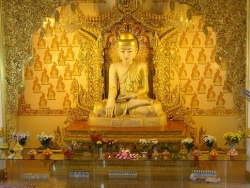Potalaka
Mount Potalaka (traditional Chinese: 補陀落山; simplified Chinese: 补陀落山; pinyin: Bǔtuóluò shān, Japanese: Fudaraku-san), which means "Brilliance", is the mythical dwelling of the Buddhist bodhisattva Avalokitesvara, said to exist in the seas south of India. The mountain is first mentioned in the final chapter of the Flower Garland Sutra, the Gandavyuha Sutra, where the chapter's protagonist journeys to seek the advice of the Bodhisattva Avalokitesvara. Later Buddhists, such as the Japanese Yogacara monk, Jōkei (monk) espoused aspiring rebirth on Mount Potalaka as an easier way to attain progress on the Buddhist path than the more well-known Pure Land of Amitabha Buddha.
Potalaka, Mount
補陀落山 (Skt; Jpn Fudaraku-sen)
A mountain said to be located on the southern coast of India, regarded as the home of Bodhisattva Perceiver of the World's Sounds. According to the Flower Garland Sutra, the boy Good Treasures, who was traveling in search of the Law, encountered Bodhisattva Perceiver of the World's Sounds on this mountain.
Mount Putuo in Zhejiang, Putuo Zongcheng Temple in Hebei and the Potala Palace in Tibet are named after Mount Potalaka.
